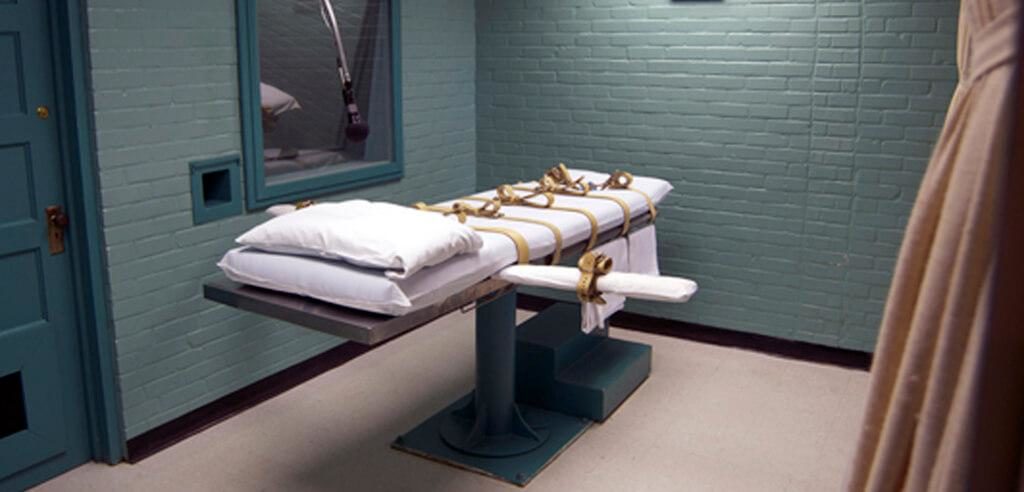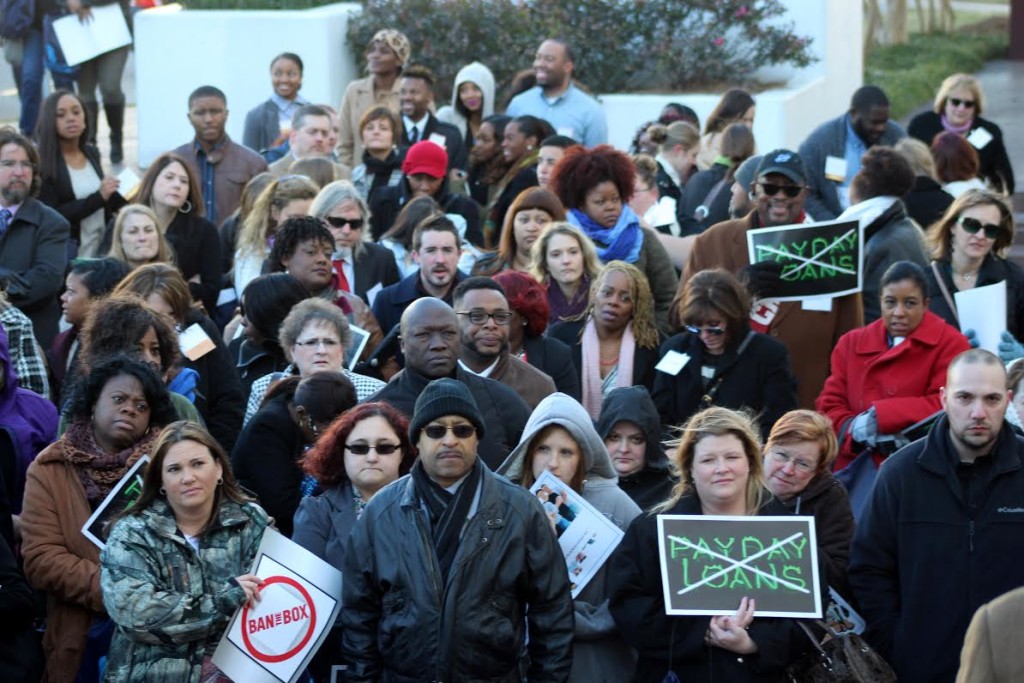Bills to give juries final say in death penalty cases moving in Alabama Legislature

A pair of state lawmakers sponsoring bills to give juries the final say in death penalty cases will hold a news conference in front of the State House Tuesday. Pike Road Republican Sen. Dick Brewbacker and Tuscaloosa Democratic Rep. Chris England are both sponsoring bills that would disallow Alabama judges from overriding the jury sentencing recommendation in death penalty cases. Alabama is the last state in the country that allows judges to override a jury’s sentencing recommendation in capital cases. Current law requires 10 of 12 jurors to recommend the death penalty. The pair will be joined by Kimble Forrister, the state coordinator for advocacy group Alabama Arise, on the steps of the State House at 11:15 a.m. Tuesday to make their case for ending judicial overrides in Alabama. The news conference is part of Alabama Arise’s 2017 Legislative Day, where the group will bring in advocates from around the state to discuss death penalty reform and the group’s other legislative efforts with state lawmakers. Over the past 40 years, Alabama judges have overridden jury recommendations 107 times, more than 90 percent of the time to hand down a death sentence when a jury recommended life imprisonment. Brewbacker’s bill, SB 16, has cleared the Senate Thursday with a 30-1 vote, while England’s version, HB 32, won approval from the House Judiciary Committee earlier this month. The major difference between the two bills is that England’s version requires the jury recommendation to be unanimous, while Brewbacker’s bill leaves the 10 out of 12 threshold unchanged.
Census numbers reveal decline in uninsured Alabamians

Health insurance statistics released Tuesday by the U.S. Census Bureau indicate that the rate of uninsured Americans dropped in 47 states last year, including Alabama. The data reveals only one in 10 Alabamians lacked health insurance coverage in 2015, an improvement from the state’s 13.6 percent uninsured rate in 2013, the last year before the Affordable Care Act took full effect. Tuesday’s numbers come in the midst of a volatile election season, where citizens across the country continue to weigh the pros and cons of the Affordable Care Act, often called Obamacare, as they decide who they’re voting for in November. For some, Tuesday’s numbers serve as a reminder for the need for an expanded Medicaid program in the state. “[The] good news about health coverage in Alabama would be even better if the state had expanded Medicaid,” said Alabama Arise State Coordinator Kimble Forrister. “More Alabamians have coverage today than in 2013, and the Affordable Care Act deserves much of the credit for those gains. Nearly 200,000 Alabamians have signed up for health insurance through the ACA marketplace. Many of them have coverage for the first time, and all of them now have the peace of mind that comes with knowing that a medical emergency won’t lead to financial ruin.” According to Forrister, Medicaid expansion would close the coverage gap for more than 300,000 uninsured across Alabama. “That would mean a more productive workforce, thousands of new jobs and big state savings on mental health care and other services,” Forrister explained. “We’re being left out. States like Kentucky and West Virginia that have expanded Medicaid have much lower uninsured rates than those that haven’t. They’re also enjoying the job creation and cost savings that come from injecting new federal money into their budgets and economies. It’s time for Alabama to expand Medicaid and reap those same benefits.”
Advocacy coalition says it’s time for Alabama to get serious and stop the Medicaid cuts

A bill that would allow Alabama to spend the $20 billion BP oil spill settlement and help fund the state’s $85 million Medicaid shortfall died in the state Senate late Tuesday night. The Legislature’s 30-day session is poised to end Wednesday and lawmakers have yet to find a way to fund the Alabama Medicaid Agency with the additional monies officials say are needed to maintain services across the state for the nearly one million Alabamians who live below the poverty line. Progress seemed to be made last week when the House approved a bill dividing the settlement money to pay off state debts and as well as road projects in coastal Alabama counties, meanwhile freeing up $55 million of the necessary $85 million for the state’s Medicaid program. But the bill stalled in the Senate’s budget committee Tuesday, leaving little hope for closing the budget gap before the Legislature goes out of session. Following Tuesday night’s impasse, Alabama Arise, a coalition advocating for low-income Alabamians, called on the Alabama Legislature and Gov. Robert Bentley to “get serious” and stop the Medicaid cuts. “Putting health care at risk for children, seniors, and people with disabilities is no way to build a stronger Alabama,” said Alabama Arise state coordinator Kimble Forrister. “Neither is lurching from one budget crisis to another because of our state’s failure to solve the General Fund’s long-term funding shortfall. “Alabama’s looming Medicaid cuts would be devastating for our most vulnerable neighbors. The cuts could prompt many pediatricians to leave the state and could end coverage of essential services like outpatient dialysis and adult eyeglasses. “The governor and the Legislature need to act quickly to prevent these Medicaid cuts from becoming a reality later this year. And our state needs to get serious about raising the long-term, sustainable new revenue needed to invest in a healthier, stronger Alabama for all.”
House OKs General Fund despite opposition, threat of veto

The Alabama House of Representatives passed a General Fund budget Tuesday, which leaves in place a roughly $85 million budget shortfall for the state’s Medicaid program. Gov. Robert Bentley has already signaled that a failure to fully fund Medicaid would cause him to veto the bill and likely call for a special session. House Democrats fought vehemently against bringing the budget to the floor, noting that a failure to fully fund Medicaid would obliterate the state’s recently announced Regional Care Organization (RCO) program and leave millions of needy Alabamians with no healthcare. Despite that, the bill made it to the floor and was debated for several hours. In the chamber, Democrats again railed against the legislation in the five-hour skirmish and members of both parties chastised Bentley for providing some Cabinet members with a significant raise while the state’s General Fund crumbles. Republicans struck back, claiming that the additional money for Medicaid just is not there and there is little to no appetite for raising taxes in an effort to collect more revenue. After passage of the bill, the Arise Citizens’ Policy Project (ACPP) released a statement condemning the General Fund budget’s failure to fully fund Medicaid. “These Medicaid cuts would be devastating for Alabamians, our economy and our entire health care system,” said ACPP Executive Director Kimble Forrister. “They could force many rural hospitals to close and prompt many pediatricians to leave the state. They would end coverage of essential services like outpatient dialysis and adult eyeglasses. And they would end promising new Medicaid reforms that would save money and keep people healthier.” “We simply can’t afford these Medicaid cuts,” Forrister continued. “It’s wrong to put health care at risk for children, seniors, and people with disabilities in Alabama. It’s time to get serious about raising the revenue needed to invest in a healthier Alabama for all.” With its passage in the House, the bill will go before the Senate. If the Senate passes the measure, Bentley has said he will veto the legislation and require lawmakers to take it up again.
Barack Obama touts success of Affordable Care Act, Alabama enrollment grows

President Barack Obama celebrated his landmark Affordable Care Act (ACA), also known as “Obamacare”, Thursday, which now boasts an enrollment of 20 million, according to a story in the New York Times. Nearly 200,000 Alabamians have signed up for insurance under the ACA as of the most recent open enrollment period, an increase of roughly 25,000 over the same period last year. According to the most recent numbers from the U.S. Department of Health and Human Services (HHS), many Alabamians have seen immense benefits from the program. 89 percent of Alabamians receiving coverage under the ACA are receiving average tax savings of $266 and 70 percent of Alabama consumers are getting health insurance for $100 or less. A Gallup poll referenced in the HHS study showed that Alabama’s uninsured rate had dropped from 17.7 percent to 14.5 percent, but noted that the state could insure another 235,000 with the expansion of Medicaid. Jim Carnes, Policy Director for Alabama noted that the expansion of Medicaid in the state would be a boon for healthcare and have a significant economic impact as well. “We have a lot of folks in the lower income level who aren’t able to apple for coverage,” Carnes said, noting he is hopeful that Alabama will follow the lead of other red states, such as Kentucky and Arkansas, which have already expanded Medicaid. Further, Carnes noted the federal funds available for expanding Medicaid, which pay 100 percent of the cost of doing so for the first three years, would go along way in stabilizing Alabama’s rural hospitals and ensuring that doctors are staying in those areas. An estimate of insurance costs through the ACA can be calculated at www.healthcare.gov – the calculated cost for a family of four, with two parents around 30 years old with no other healthcare access and no prior health issues, plans range between $214 and $391 a month after a tax credit of just over $240. There are 12 plans available from either Blue Cross/Blue Shield of Alabama or UnitedHealthcare. The Alabama Department of Public Health did not respond to requests for comment regarding the impact the ACA has had on Alabama citizens.
State House rally brings sheaf of issues, including call to end death penalty

In the freezing cold Wednesday morning, the National Association of Social Workers (NASW) gathered outside of the Alabama State House, along with representatives from a variety of organizations, to rally supporters to contact lawmakers on a myriad of issues. Martha Shearer of Alabama Arise was first to address the over-sized crowd to discuss the initiative known as “Ban the Box,” a campaign to encourage employers to remove the criminal record check box from their applications. Shearer noted that many people are thousands of dollars in debt and unable to find work because of a previous run-in with the law. Esther Brown, from Project Hope to Abolish the Death Penalty (PHADP), was next to address the audience. She noted that there is no way to reform the death penalty because it is “intrinsically” and “morally” wrong. Brown referred to the death penalty as “state murder” and contended that the death penalty offers no solace to relatives of a murder victim. The claim carried more weight since Brown is herself a relative of a murder victim. “Healing has to come from within,” Brown said. “We have no right to kill anyone.” John Pickens, executive director for the Alabama Appleseed Center for Law and Justice, addressed the crowd next on current problems with payday and title loans, which he said prey on low-income and working families,” and voting rights. Pickens took particular exception to an Alabama database that lists “50 to 70” crimes as including “moral turpitude,” which bars ex-felons from the right to vote. He pushed for lowering the number of crimes that permanently bar a person from voting and condemned the “cumbersome process” former inmates have to go through to reinstate their voting rights. Heather Allman of Troy University also addressed the crowd on the importance of stopping youth tobacco use. Allman called for removing advertisements from convenience stores, which often lure in young customers, as well as a ban on smoking in public places.
Felony drug offenders now eligible for SNAP, TANF benefits in Alabama

On Saturday Alabama joined most U.S. states by allowing people with a past felony drug conviction to receive Supplemental Nutrition Assistance Program (SNAP) benefits, as well as Temporary Assistance for Needy Families (TANF) assistance, according to a news release by Alabama Arise. The lifetime ban on SNAP, formerly known as the Food Stamp Program, and TANF benefits for drug offenders grew out of a 1996 federal welfare reform law enacted by former President Bill Clinton, though the law does allow states to request a waiver. Though most other states requested a waiver before, Alabama included reinstating the benefits in a 2015 prison reform law sponsored by Sen. Cam Ward (R-Alabaster) with a floor amendment offered by Sen. Linda Coleman (D-Birmingham). Restrictions still apply to drug offenders seeking benefits, including the completion of their sentence and probation requirements. Further, persons with a drug offense in the past five years may be required to pass a drug test to receive TANF benefits. People previously denied Snap or TANF benefits because of a drug offense can apply at a local Department of Human Resources office after Monday. Further, households already receiving benefits but have a household member not included because of a drug conviction can report the “newly eligible person” to the household’s caseworker. “The end of Alabama’s SNAP and TANF bans is good news for state budget and for families,” the Arise news release said. “The policy change will help cut corrections costs in the cash-strapped General Fund budget by making it easier for released prisoners to reintegrate into the community, which will help reduce recidivism. Importantly, restoring SNAP and TANF benefits also will help prevent hunger and homelessness among some of Alabama’s most vulnerable families.” Officials with Alabama Arise estimate that 30,000 to 80,000 Alabamians would become eligible for SNAP benefits under the change, with TNF benefits being harder to monitor because they are more difficult to secure. Both programs are funded by federal dollars, so the influx of new beneficiaries will add no new costs to the state.
Alabama House panel debates cap on title loan interest rates
Alabama title loan companies could see a 36 percent cap on the interest rates they’re allowed to charge consumers under legislation under consideration in the House. The House financial services committee heard public arguments Wednesday about tightening regulations of subprime loans that use cars and other assets as collateral. House Bill 400 requires title lending companies to be licensed by the state and adhere to state-level restrictions on the charges, interest, and fees associated with title loans. The Federal Deposit Insurance Corporation estimates that 1.1 million households used auto title loans in 2013. Alabama lenders are allowed to charge 25 percent per month for an auto title loan, translating to as much as 300 percent on a yearly basis. “We’re talking about an industry that doubles its money three times on an annual basis,” bill sponsor Rep. Rod Scott said. “We know that’s not appropriate. From the consumer’s perspective, that’s usury.” Scott said he brought the bill because of concern over what he describs as unfair practices and predatory lending to Alabama’s poorest households. The result, he said, is that people have to ask family, churches or nonprofit groups for help to pay off the loans. “You can’t borrow your way out of debt, especially when the interest rates are so onerous,” Scott said. Osjha Domenicone, head of government affairs for title loan company Select Management Resources, said her company has had only two complaints in five years. “Other states that have passed price restrictions like the ones in this bill have seen an increase in complaints because their citizens are left with nothing but unregulated, unaccountable online lenders,” she said. “I assure you, a 36 percent cap does eliminate the industry and this access to credit … I have a difficult time understanding why my customers and employees should suffer over two complaints in five years.” Stephen Stetson from Alabama ARISE argued that in the 25 states without a title loan presence, consumers can still access credit through traditional banking. Several members expressed concern over imposing regulation at the state level, when the federal Consumer Financial Protection Bureau is expected to take action on payday and title lending this year. “Anything we do is just going to get overturned at the federal level,” Rep. Mike Hill said. The panel declined to vote on House Bill 400 Wednesday. Stetson said that with just seven days left in the regular session, that decision would mean another year of predatory lending for Alabama consumers. “We’re looking at a long off-season where more people are going to get their cars repossessed or get trapped in more loans,” Stetson said. “It’s a shame that 67 bill co-sponsors – which is enough (votes) to get it passed on the House floor – wasn’t enough to get this bill through committee.”
House budget panel to vote on proposed cigarette tax increase

Alabama business leaders and advocates testified Tuesday before the House’s General Fund budget committee about the economic and health consequences of increasing the cost of tobacco products purchased in the state. The public hearing was to consider Rep. Patricia Todd’s House Bill 572, a proposal to increase the state tax on tobacco products by 25 cents. Advocates supporting higher cigarette taxes warned the panel that the bill didn’t go far enough to bring substantive health and economic benefits. Kimble Forrester, executive director of Alabama ARISE, said that an increase of at least 55 cents per pack is necessary for the state to see a decrease in health costs, as well. “The studies I’ve seen say that you have to raise taxes enough by at least 10 percent per pack to give people some sticker shock,” he said. Others spoke against a higher tax, warning that the increase would send consumers across state lines to purchase tobacco at lower costs per pack. A retailer from Andalusia said that dozens of his customers come from neighboring Florida “because it’s $10 a carton cheaper.” House Bill 572 is the smallest of three proposed cigarette tax increases lawmakers have considered. Originally, Todd had proposed a tax increase of 32.5 cents. And as part of his budget plan, Gov. Robert Bentley had proposed an 82.5-cent tax increase on cigarettes. Todd’s proposal was one of several before the committee today as lawmakers try to agree on a path to overcome an estimated $541 million shortfall in the state budget. The committee also heard comment on legislation to increase taxes on car sales and car rentals, along with two proposals to cut state employee pay through furloughs or by cancelling annual bonuses. The committee chairman indicated that the panel will reconvene on Wednesday for a formal vote.


